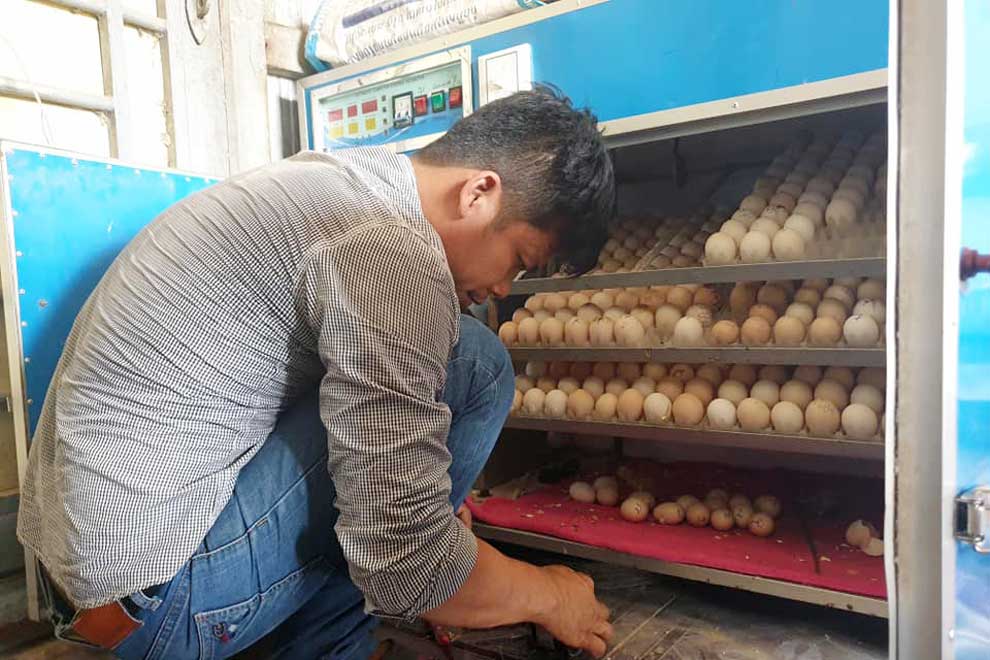
Growing up as a farmer in Kampong Thom province, Lon Sophea often heard villagers complaining about how their chickens were producing fewer chicks.
Chickens would leave their un-hatched and broken eggs behind and wander off.
Sophea realised that the traditional methods of raising chickens still used by farmers today were hampering their lives.
“Before I started making incubators, I raised chickens in the backyard of my house. At that time, I faced a lot of problems due to poor management of my small chicken farm. It was a disaster,” the 35-year-old Sophea says.
Many of the eggs didn’t survive unharmed long enough for a chick to hatch.
There were many hens laying eggs uncontrollably, he says, and nearly all of the eggs were damaged. The eggs from different chickens mixed and the hens would peck the eggs that weren’t theirs. This, Sophea says, resulted in a reduction of the number of chicks.
Seeking a solution, he started researching and studying methods to improve his operation.
He says he didn’t want to completely modernise his rural poultry farming methods because chickens from the countryside, “moan srae” in Khmer, are considered tastier than mass-produced poultry. Moan srae can also be sold at a higher price.
During his research, he came across a YouTube advertisement about a chicken incubator with the capacity to hatch 527 eggs at once.

The incubators automatically set the perfect temperature and humidity for hatching. Photo supplied
Sophea bought it and learned how to use it, but it broke within six months. Instead of buying another, he chose to make one himself.
“I could use the metal-frame incubator I bought online for about five to six months. Then I thought if I build one myself and I know how to fix it, it will be easier,” he says.
Sophea took two specialised courses in Phnom Penh, bought the equipment he needed and returned to his home in Kampong Svay district armed with the knowledge and tools to create his own incubator.
After some trial and error, he was successful and started selling his incubators through Facebook. Soon, his phone was buzzing and his inbox was filling with messages from interested customers.
Sophea offers two choices: a styrofoam version or the standard heavy-duty metal-frame version.
The $50 Styrofoam incubator requires less electricity, but users have to turn the eggs themselves two to three times per day.
“I want these DIY [do-it-yourself] styrofoam incubators to become widely used because they are easy to assemble and less complicated,” he says.
He says that farmers can install the styrofoam incubators themselves. Though they require more manual effort, farmers can save on costs by using them.

The metal incubator is made with steel, aluminium alloy, zinc and Styrofoam. Photo supplied
The standard metal incubator is made with steel, aluminium alloy, zinc, and Styrofoam, which are all essential elements to maintain heat and humidity.
Humidity levels between 65 and 75 per cent and temperatures between 37-37.5 Celsius are ideal conditions for egg-hatching success.
After hatching, newly born chicks should remain in the incubator until their fur is well-dried. The yolk they absorb just before hatching nourishes them for 72 hours.
The incubator can be used to hatch eggs from ducks, chickens, dove, geese, pigeons, and quails.
Sophea says his incubators automatically set the perfect temperature and humidity for hatching and they can hold up to 10,000 eggs at a time.
He says his incubators prevent damage to eggs, increase chick populations and boost productivity.
Within five months, his incubators have been shipped to egg farmers in Phnom Penh and across the country.
Even government officials have ordered his incubator to subsidise farmers.
“I think it is a basic technology to help farmers struggling to hatch eggs conventionally,” Sophea says.
Despite incubators being common elsewhere in the globe, some rural farmers are still unfamiliar with the technology.
“Some farmers have not had access to this technology and are not aware of this information because promotion campaigns don’t reach rural and remote areas”, he says.
Sophea encourages farmers not to give up if they fail on their first try and offers training to those who request it.

The $50 Styrofoam incubator requires less electricity, but users have to turn the eggs themselves two to three times per day. Photo supplied
For now, he is the only member of his small enterprise. It usually takes him one day to build a small incubator and a few days to build bigger ones.
He customises the size of the incubators to meet customers’ specific needs.
“The minimum capacity is 80 eggs and the maximum capacity is 10,000 eggs,” Sophea says.
He suggests that people who have large plots of unused space raise animals to earn extra income. Sophea says he is hoping to add an employee to his workshop soon to speed up his production.
For more information, contact Lon Sophea at 012 400 589, 070 577 709 or 097 507 7709.

.jpg)














